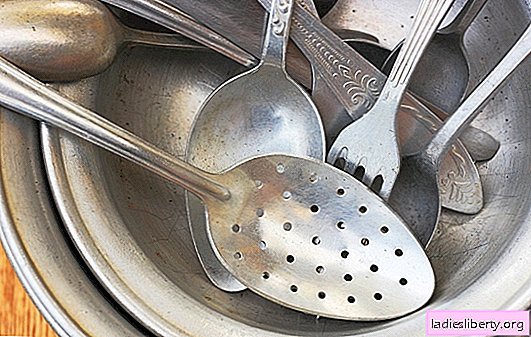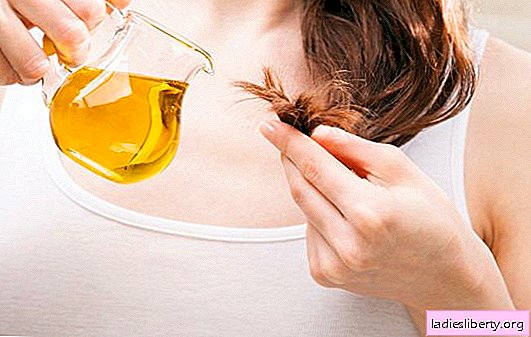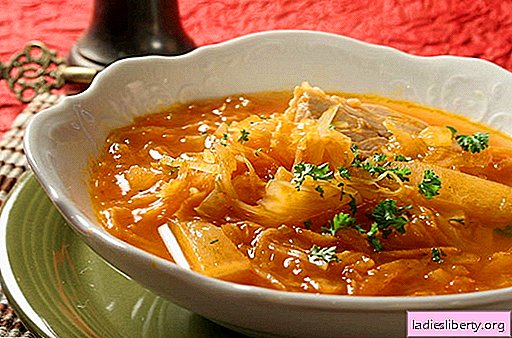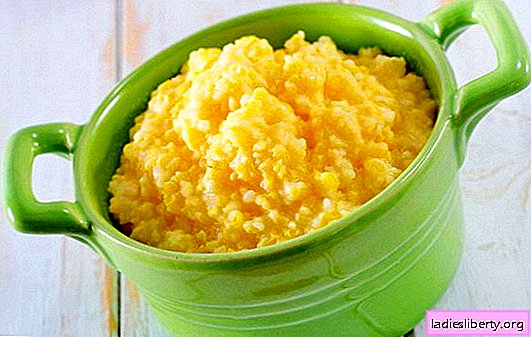
Modern kitchen utensils and accessories have gradually supplanted such familiar aluminum pots, colanders, bowl mugs that are widely used by our grandmothers and mothers. On the one hand, the "scales" - the brightest variety of colors, design, details, on the other - the discreet shine of light silver classic forms.
Pans cleaned to a dazzling brilliance cause a nostalgic feeling. What did they not please, why were the benefits and harms of aluminum utensils on the scales?
The harm of aluminum to the human body
It is no secret that aluminum is a rather toxic metal, and although it is found in drinking water and very many food products, as well as medicines, an excess in the body causes very serious consequences. A dose of 1 g is fatal for humans, the acceptable value is 30-50 mg / day. But studies show that usually no more than 3-5 mg of aluminum enters the body with food - as you can see, the dose is far from lethal. One nuisance is that metal builds up in the body and over the years leads to irreversible changes:
• the metabolic process in the body is disrupted, and this, as you know, is the basis of the functioning of all vital systems of the human body;
• prolonged exposure to even the most meager metal concentrations gradually leads to degeneration of the processes of the nervous system and accelerated brain aging - Alzheimer's disease;
• aluminum removes calcium from the body, contributing to the development of osteoporosis, weakening of bone tissue, and prevents the synthesis of hemoglobin.
The harmful effect of aluminum on the human body is due to the fact that aluminum and iron ions are very close in size and mass - harmful aluminum, under favorable conditions, replaces useful iron (this was proved by scientific research by American scientists).
But, imagine that the “horse dose” of aluminum comes through medications (mainly against heartburn) and through the skin while using antiperspirant deodorants. So do not immediately throw away aluminum utensils - we will consider what is harmful and useful for household items.
How to use aluminum utensils and what to cook in it so as not to harm health?
Yes, the damage from a toxic metal to the human body is really huge. But how much does it get to us from the dishes? On this score, the opinions of scientists were divided, but they agree on one thing: if you use aluminum pots correctly and cook certain products in them, there will be no harm from this.
Since aluminum has a high chemical activity, substances that easily react with it should be avoided - mainly acidic, alkaline and salty foods. As you know, an oxide film forms on the surface of the dishes, which protects food from the penetration of aluminum particles. Surely every housewife noticed that after cooking some dishes - tomato sauces, borscht, stewed fruit, jam, etc. - the surface inside the pan became perfectly clean and shiny. This is because the organic acids contained in tomatoes and other vegetables, fruits, during the cooking process destroyed the protective oxide film, and aluminum freely penetrated into the cooked food.
What can be cooked in aluminum dishes
In aluminum utensils it is useful to cook the following dishes and products without fear for the health of home:
• pasta, pastry dishes - dumplings, dumplings, dumplings, etc .;
• any cereal;
• boil potatoes and some other vegetables that do not contain acids;
• cook fresh fish;
• cook lean meat, jellied meat;
• boil ordinary drinking water, bottles for baby food;
• use aluminum molds for baking bread, cakes.
But even these products, which are allowed to be cooked in aluminum utensils, are strictly prohibited to be stored in it - immediately after cooking, you must use the dish or transfer it to an enamelled glass dish or containers.
What you can not cook in aluminum dishes
Unfortunately, there are several more contraindications to cooking. Any vegetables and fruits containing acids, salty foods very quickly react and destroy not only the protective oxide film, but also “etch” particles of toxic metal. So, it is very harmful, and even strictly forbidden, to cook in aluminum utensils:
• fruit and berry compotes and preserves, as they contain a large amount of acid;
• sweet and sour sauces, tomato sauce, boil tomato or fruit juice;
• use for salting mushrooms and vegetables (cucumbers, cabbage, etc.), as well as fish, lard;
• make yeast dough;
• cook borsch, cabbage soup from sauerkraut;
• any dishes for diet and baby food;
• boil milk, especially store fermented milk products - fermented baked milk, cottage cheese.
How to choose the right aluminum cookware
Metal utensils are made in various ways, the main thing is to be able to choose correctly so that aluminum utensils bring maximum benefits in the household. Pots and other utensils are made in two ways - by stamping from aluminum sheets or forging. Stamped pans, ladles, colanders and other household items are very light, have high thermal conductivity and low cost. In such a kettle, water will boil in a matter of minutes! But since aluminum is a very soft metal, dents are easily formed on thin stamped dishes, and it quickly loses its attractive appearance.
Shod (cast) ware from aluminum is much stronger and heavier, and also more expensive. Its walls are thicker, perfectly protect the dish from burning, so a cast aluminum pan is useful for stewing non-acidic vegetables and lean meat. Such dishes in properties, strength and durability are similar to cast iron.
How to care for aluminum utensils
A whimsical soft and chemically active metal needs “special” care - no, no, nothing unusual and complicated, but on the contrary - the simpler the better. The golden rule is a minimum of abrasive materials and chemical cleaners, and no dishwashers.
All kinds of pastes and metal nets for cleaning aluminum dishes will only harm her - they will spoil the protective layer of oxide and make it unsuitable for cooking. A large number of detergents that are used in the dishwasher form an active alkaline environment, and the dishes may become dark stained.
Therefore, if you already use aluminum kitchen utensils, wash them immediately after use under running hot water, if possible without detergents.
TIP! The activity of the metal has its advantages: the oxide film is easily restored if you put water in the pan, leave it for 10-15 minutes, and then pour and wipe it dry.
Do not abandon the light, convenient, durable and such familiar aluminum utensils - they can be used with the benefit of the household and without harm to health, adhering to basic rules.











